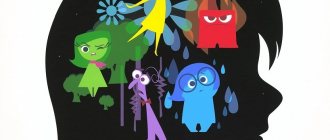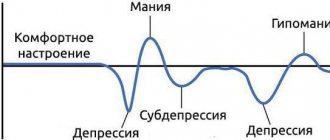The human body is an amazing combination of many organs, tissues, functions, chemical reactions, electrical impulses that allow a person to live, recognize and experience the world around him. Cognition occurs through influences on the human senses - light, sound, taste, smell, tactile and spatial perceptions. All this is the basis of human knowledge and existence in the world around him. And perceptual disorders, whatever they may be and for whatever reasons they occur, are a serious problem.
Perception: reality plus imagination
The fact that a person can perceive the world around him involves the senses and imagination. The knowledge that is obtained through vision, hearing, taste, tactile influence, smell and determining the position of the body in space is processed by special parts of the brain and, with the help of imagination and previously gained experience, become ideas about the world around us. Perception disorders in any area do not allow a person to obtain a holistic picture.
Far and near
Disorders of sensations and perception of received data are closely interrelated. Receptors that receive information about the surrounding reality transmit nerve impulses to the brain, where analysis and processing of the received information occurs and a response occurs in the form of an idea of an object or phenomenon that affects the receptors. Moreover, some of the receptors should receive such an effect through direct contact with the object, and some through space. So, for example, taste sensations arise when food enters the mouth and tongue. But vision allows you to see objects at a distance. The perception of received information through various senses and receptors is the main mechanism for human cognition of the world. Perceptual disorders are a complex physiological and psychological problem.
Diagnostics
If the patient complains of impaired speech perception, the otolaryngologist determines the level of hearing using audiometry. The simplest method of audiometry is to check the level of speech perception at different distances and at different volume levels. The ability to hear a whisper at a distance of 6 meters is considered the norm. Audiometry using special equipment allows you to assess the level of tonal hearing. With phonemic regression, the levels of tonal and speech types differ sharply - tonal remains normal or decreases slightly.
To diagnose organic lesions of the apparatus, ultrasound is performed; MRI is recommended to study changes in the structure of the brain. When diagnosing central hearing lesions, an EEG is performed using sound stimuli.
Sense organs and receptors
In addition to the six senses known to everyone from school, the human body perceives many more stimuli. So, there are receptors responsible for the perception of heat - cold, pain, as well as sensations of your body. So science identifies not six, but 9 types of sensations:
- vision;
- hearing;
- sense of smell;
- touch;
- equibrioception - sense of balance;
- taste;
- nociception - perception of pain;
- thermoception - feeling of heat;
- proprioception - spatial awareness of your body.
Receiving information about the world around us with the help of various receptors, the brain processes it into perceptions of the surrounding reality.
Perceptions and medical practice
If any disturbances occur in the human body, a big problem may arise - perception disorders. Psychiatry, as a scientific and practical field of medicine, studies these disorders and, as far as possible, helps correct them. Psychiatrists have been studying perception disorders for centuries, helping not only the patients themselves, but also the people around them, to live with such problems. Disturbances in the functioning of one or more sense organs are not always disorders of a complex analysis of the surrounding world. A person who has lost his sight knows what objects and colors really look like and, with the help of the other senses, can imagine a real picture of the world around him. In psychiatry, disorders of the perception process are a whole complex of disorders caused not so much by problems in the functioning of receptors, but by changes in the processes of processing received information and obtaining the final result.
I feel disconnected from the world. What's happening?
Natasha, wait to be scared, let's try to figure it out.
Jamevue It is really rare. It can be a temporary phenomenon in mentally healthy people with severe mental stress or overwork. But doctors consider any recurring memory distortions to be one of the symptoms of some mental disorder.
Therefore, I recommend going to see a psychiatrist at the PND to determine whether there is a possibility of any psychiatric illness. If the doctor discovers a disorder, he will prescribe therapy, the process will stop, life will become easier and fears will decrease.
About her own, but she did a lot, just as for herself. All free money and time were given to home and mother. And not only mine, but also my sons and husband then. Before the New Year, my mother broke her leg. And the decision was made to take an apartment. My brother got the loan. The house is for sale.
By and large, we were simply presented with a fait accompli.
You had a home that you invested in and considered yours. And suddenly, all at once, you were presented with a fait accompli and the house was taken away. You asked your brother why the house was put up for sale without consulting you. Will he get the apartment too? Have you asked your mother any questions about the inheritance?
Bottom line. I'm completely out. I don't feel time. Muddy. I don't understand reality.
When there is a violation of the perception of reality, otherwise derealization, the world is perceived as unreal or distant, devoid of its colors and in which memory disturbances can occur - deja vu and jama vu.
Derealization is often associated with depression and is the main component symptom of anxiety neurosis or other mental disorders, also often together with depression or neurasthenia.
Describe your self-perception. Sense of self. Are there any changes in this? Disorder of self-perception of personality and alienation of its mental properties. Loss of sense of self. Do you notice the erasure of your personality traits? What emotions are you capable of now and how do you feel towards your loved ones?
Is the environment perceived dullly, as if through glass? Feeling like time is moving slowly or completely stopping?
Are thoughts in your head and memory as usual, or are there no thoughts and your memory is clearly reduced?
Absence of the very concept of “mood”
Difficulty in imagining, imaginative thinking
Dullness or absence of pain, tactile, temperature, taste, sensation of weight, feelings of sleep, hunger and satiety?
Derealization can “switch on” during prolonged chronic stress, fatigue, and the inability to regain one’s strength. Besides the situation with your home and your mother, is there anything else going on in your life that can be defined as prolonged stress and fatigue?
How are you recovering?
How do perceptual disorders manifest themselves?
The field of psychiatry is a special field of medicine that studies various mental disorders and their manifestations. This is a very specific area of human knowledge, which operates with the concepts of “disease”, “health”, “norm” and “pathology” in relation to mental state. One of the areas of work of a psychiatrist is perceptual disorders. Psychiatry considers such problems to be mental pathologies. Disorders of sensation and perception are manifested by several conditions:
- Anesthesia is manifested by an inability to perceive tactile sensations, taste and smell. Its manifestations are similar to medical anesthesia, which is caused to turn off the sensitivity of pain receptors in patients during medical interventions.
- Hyperesthesia is a sensitivity disorder caused by a seeming increase in smell, light, and sound. Very often, hyperesthesia occurs in patients who have suffered a traumatic brain injury.
- Hypoesthesia is the opposite of hyperesthesia, a change in sensitivity. Sensory perception reduces natural stimuli. Patients with depressive disorders suffer from hyposthesia, for whom the world seems dull and boring.
- Paresthesia is expressed in sensations of itching, burning, tingling, and “pins and needles” caused by impaired blood supply and innervation. Often, paresthesia occurs in the Zakharyin-Ged zones: problems of internal organs manifest themselves in the form of unpleasant, painful sensations in certain areas of the surface of the human body.
- Senestopathies are unpleasant sensations that arise inside the human body; they are difficult to describe in words; most often the patient uses vivid comparative images to talk about these sensations.
“Wrong” sensations sometimes coincide with the clinical manifestations of any disease, and not only from psychiatric practice. A competent diagnosis of a disease or condition is the basis of quality treatment.
Treatment
For hearing impairment associated with infectious diseases or injuries, appropriate therapy is provided. Antimicrobial, non-steroidal anti-inflammatory (Ibuprofen, Diclofenac) and vasoconstrictor drugs (Naphthyzin, Otrivin) are prescribed. In most cases, surgery is not required for a perforated eardrum.
If the function of the inner ear is impaired due to damage to hair cells or contusion, nootropics (Piracetam, Nootropil, Vipocetin), B vitamins, antihypoxants (Trimetazidine, Meldonium, Actovegin), corticosteroids (Prednisolone, Celeston) are prescribed. Physiotherapy is used - pneumomassage and hyperbaric oxygenation.
Treatment of central hearing disorders associated with organic pathologies of the brain is carried out only in a hospital setting. If drug and surgical treatment are ineffective, rehabilitation therapy is recommended - selection of a hearing aid, and in most cases, after an adaptation period, speech perception in patients is restored.
The reception is conducted by specialists
Kirillov Evgeniy Sergeevich
Audiologist
Cost of services
Initial consultation with an audiologist
1200₽
Repeated consultation with an audiologist
1000₽
Major Perceptual Disorders
Psychiatry as a field of clinical medicine operates in terms of methodology, diagnosis, treatment and prevention. To make a diagnosis, it is necessary to clearly know the manifestations of the disease; clinical tests, medical history, laboratory and instrumental studies help with this. The categorical nature of judgments allows one to correctly interpret the data obtained in order to make an adequate diagnosis. In psychiatry, there are two main categories of perceptual disorder to refer to certain mental health problems:
- illusions;
- hallucinations.
Both concepts evoke quite negative feelings in most people, but the patient himself has no control over them, although in many cases such disorders occur due to conditions into which a person has driven himself, for example, drug or alcohol poisoning. Some types of perception disorders can occur in completely healthy people in terms of psychiatry.
Blue Caterpillar from Wonderland
“What you see, but which is not really there” - that’s it, a hallucination. Problems in perceiving reality as it really is are manifested by the emergence of pseudo-real images. Psychiatry, studying perception disorders, defines hallucinations as an image that appears in the mind and is defined as really existing, but without an external stimulus affecting human receptors. These images appear out of nowhere, so to speak, due to a disorder of perception. Psychiatrists divide hallucinations into several types:
- True hallucinations are vivid images that for the patient have certain shapes, colors, smells, and produce specific sounds. True hallucinations are perceived by the patient as a manifestation of reality through his senses, he tries to manipulate them, as if the phenomena or objects he sees exist in reality. In addition, according to a patient experiencing true hallucinations, all people around him should perceive them exactly the same way as he does.
- Pseudohallucinations are perceived by the patient as something unnatural, but really existing; it is devoid of brightness, often incorporeal, and can originate either from the body of the patient himself, or from areas not subject to his receptors. Often, false hallucinations are considered by the patient to be forcibly inserted into his body with the help of special devices, devices, machines, or due to mental influence exerted on him.
In addition to these two types, hallucinations are also divided according to the sense organs by which they can be caused:
- visceral;
- taste;
- visual;
- olfactory;
- auditory;
- tactile.
Each type of hallucination has its own scientific definition and can be divided into several subtypes, which is important for clinical psychiatry.
By the way, hallucinations can be suggested or caused. One of the methods of psychiatry uses the Aschaffenburg symptom, when the patient is allowed to listen to a previously switched off telephone, thus testing his readiness for auditory hallucinations. Or Reichardt's symptom is a symptom of a blank sheet: the patient is given a completely white sheet of paper and asked to talk about what is depicted on it. Hallucinations can also be functional, occurring against the background of stimulation of certain receptors and disappearing after the stimulus is removed. By the way, the image of the Blue Caterpillar smoking a hookah on a mushroom cap from Lewis Carroll’s fairy tale “Alice in Wonderland” is considered by many to be a classic hallucination.
Such a beautiful illusion
In psychiatry, there is another type of perception disorder - illusion. Everyone is familiar with this concept, even those who do not suffer from psychiatric perception disorders. People often use the expression “beautiful illusion, terrible illusion.” So what is it? The scientific definition of one of the types of perception disorder sounds like an incorrect, erroneous perception of objects that exist in reality. Deception of the senses is what illusion is. For example, an illusion can occur when the level of stimulus is insufficient - in the dark it is very easy to mistake the outline of a bush for a human figure. So the emergence of illusions is not always the area of psychiatry. Characteristic signs of illusion are:
- object or phenomenon subject to sensory distortion: figure, voice, tactile or spatial sensation;
- distortion, incorrect perception and evaluation of a real object;
- the illusion is based on sensory perception, that is, a person’s receptors are actually affected, but it is perceived somewhat differently than it actually is;
- the feeling of the false as really existing.
Visual perception disorder is one of the common illusions of healthy people. Moreover, such an error may be of a physical or physiological nature. The physical nature of illusions has nothing to do with psychiatry; the same mirage in the desert has a logical basis, albeit not too simple, but proven by the exact science of physics. Clinical psychiatry considers psychopathological illusions:
- affective, arising against a background of fear or nervous excitability about impending danger;
- verbal, i.e. verbal, illusions - individual words or phrases that are heard by a person;
- pareidolic illusions - visual illusions that arise against the background of a real image by inventing images, for example, a pattern on wallpaper can become an illusion of the frightening content of the picture; Most often, such illusions are observed in creative individuals; for example, scientists have found that Leonardo da Vinci suffered from pareidolia.
The basis of illusions is disorders of perceptions and ideas about the world around us. They are not always pathological in nature. They are often caused by a distortion of perception due to an incorrect assessment of the functioning of the receptors.
Loss of sense of reality
-You look sick. - Poisoning. - How? - Reality.
Advertising: Means for escaping reality.
He had illusions. They got fat and crowded out reality.
The constantly adored woman loses her sense of reality.
Jokes
Loss of a sense of reality as a personality quality is the inability to understand and realize the real reality of one’s life; soar in the clouds, build castles in the air, get lost in dreams, idealizations, fantasies, illusions, euphoria and virtual reality.
Our sense of reality betrays us whenever we idealize our capabilities.
One 80-year-old man came to the doctor for a medical examination. - Well, how do you feel? - the doctor asks him. “Better than ever,” the old man answers bravely, “I have an 18-year-old friend, she is pregnant and our child will be born soon.” Well, what do you say, doctor? The doctor thought for a minute and said: “I’ll tell you a story.” I knew one person, an avid hunter. One day he was getting ready to go hunting and by mistake took an umbrella with him instead of a rifle. And here he is walking through the forest, when suddenly, out of nowhere, a huge bear crawls out, and right at him! This guy was not taken aback, threw up his umbrella, pressed the handle and... the bear fell dead at his feet! “Well, that’s impossible,” the old man objected, “probably someone else fired at that time.” “Actually,” said the doctor, “this is what I’m trying to bring our conversation to.”
Most often, a complete loss of sense of reality occurs with people who have been in power for too long.
Only a person detached from the needs of the people, who had lost all connection with reality, could say: “If they don’t have bread, let them eat cakes!”
Jokes on topic.
- The government promises: - We will live well! People: What about us?
- There is no money, but you hold on, all the best, good mood and health to you!
Phone call. Brezhnev picks up the phone: “Dear Leonid Ilyich is listening!”
Brezhnev called a group of cosmonauts. - Comrades! The Americans landed on the moon. We thought about it and decided that you would fly to the Sun! - So we’ll burn, Leonid Ilyich! “Don’t be afraid, comrades, the party has thought about everything.” You will fly at night.
People in power become dizzy from pride, from constant self-praise and external praise, self-adoration and self-admiration, and they completely lose their sense of reality.
You can count on one hand the number of people who have a sense of reality. This is a rare personality quality. Most people live in a world of illusions, false beliefs and idealizations. Having lost their sense of reality, they spend their whole lives in fantasies and the virtual world, soaring in the clouds, adjusting the realities of life to their ideas about them.
If a person is denied rationality and pragmatism, reality ceases to be taken into account.
Each person sees his own reality and, as a rule, does not realize how much it differs from the real reality.
The sense of reality is lost as pride, exorbitant vanity, star fever, morbid ambition and excessive ambition grow in a person.
Reasonable ambitions lead to success, excessive ones lead to a loss of sense of reality. Hence personal tragedies, failures and painful disappointments.
Having lost the sense of reality, a person greatly exaggerates his personal potential, his abilities, capabilities, resources and sets himself unaffordable, inadequate, unrealistic goals. Goals should always be ambitious, but if they are completely divorced from the realities of life and are not supported by the necessary resources, they turn into fruitless dreams and fantasies.
An anecdote on topic.
The man wanted to become a great scientist. Fifty years have passed, and all his ambitious plans, divorced from reality, have collapsed. I decided to hang myself. He took the rope and went into the forest. As soon as I threw the rope, Baba Yaga was there. - What are you going to do? - Yes, just like that, they say, and so, I won’t be a Lomonosov. “It’s all nonsense,” says Yaga, “I can fix everything!” You will become Newton, and you will put Lomonosov in your belt. - What do you ask for this? - says the man. - I won’t ask for anything - let’s have sex just once, otherwise I haven’t had a man for two hundred years.
Well, man, he barely suppressed his disgust and fulfilled Yaga’s whim. He says: “Well, it’s done, come on, realize my ambitions.” - And how old are you? - asks Baba Yaga. “Well, it’s already 50,” the man answers. - What are you asking? - Oh, you’ve lived so much, seen so much, and still believe in fairy tales!!!
People who have lost their sense of reality often become beautiful-minded. They see reality through rose-colored glasses, so they are constantly deceived, cheated, and taken for suckers. But everything is not for the future. They still believe in universal human decency and nobility. I would like to assign security to them.
That is, great-heartedness coupled with a loss of a sense of reality is dangerous due to a loss of vigilance, isolation from life, loss of connection with reality, and the simplification of all issues and problems.
The loss of a sense of reality prevents you from descending from heaven to earth, returning to real life from the world of dreams and daydreams.
Idealization and a sense of reality are incompatible things. Having become an adherent of any idealization, a person thereby loses his sense of reality. In a word, the sense of reality is lost when immersed in idealization.
An anecdote on topic.
The little mouse saw a bat, comes home and says to his mother mouse: “Mom, mom, I saw an angel today!”
The sense of reality melts before your eyes when lovers are in front of you. The stronger the love, the more the lover loses his sense of reality. Falling in love sharpens all feelings at times, making an exception only for the sense of reality. All the happiness of falling in love is in euphoria, in the loss of a sense of reality. The lovers are floating in clouds of euphoria. With blinders on their eyes, they completely lose their sense of reality and therefore do not notice each other’s shortcomings.
An anecdote on topic.
The newlyweds lie down in bed. The bride undresses. The loving groom looks at her in surprise. - Tanya, why don’t you have a belly button? - And in the hostel it was erased.
Where the euphoria of falling in love reigns, it is frivolous to talk about a sense of reality. A lover sees the object of his love with eyes full of idealizations - in isolation from the earth, against the backdrop of stars and the bottomless sky. He is ready for anything: - Darling, I will lead you to the very edge of the Universe, I will give you this star! With imperishable light she will illuminate our path to infinity...!
The sense of reality finds true allies in common sense, prudence, sobriety, awareness and realism.
A realist always prefers to be in a state of friendship with a sense of reality. He is the enemy of idealization. He knows how and is used to staying in reality, and not in empty fantasies, fruitless dreams or fairy tales. Unlike an idealist, who tends to constantly idealize reality, not notice its negative sides, and show impracticality and isolation from the realities of life, a realist perceives objects and phenomena of the surrounding world without any excess or redundancy.
The loss of a sense of reality is caused by blind optimism, neglect of risks, the illusion of invulnerability, and idealization of one’s abilities and appearance.
An anecdote on topic.
Husband naked in front of the mirror: - Another two centimeters and I would become a king! His wife, looking at him: - Minus two centimeters, and you would become a QUEEN...
Peter Kovalev
Other articles by the author:
Thinking and memory in perceptual disorders
What distinguishes Homo sapiens from all other living beings? Ability to think. Thinking is the main cognitive process that unites the world around a person into a logical picture. Thinking is inextricably linked with perception and memory. All the processes that characterize man as a rational being have changed, developed and transformed over thousands of years. And if at first it was only necessary to apply physical force to satisfy one’s natural needs (food, reproduction and self-preservation), then over time a person learned to build logical chains - to think in order to get the desired result with less physical effort and harm to one’s health and life. To consolidate the favorable result obtained, memory began to develop - short-term, long-term, as well as other mental functions characteristic of people - imagination, the ability to see the future, self-awareness. The symbiosis of perception and thinking disorders is psychosensory disorders. In psychiatry, these disorders are divided into two main types:
- depersonalization can be manifested by both incorrect sensations of one’s body, the so-called mental depersonalization, and distorted concepts of one’s own “I” – mental depersonalization;
- Derealization manifests itself in a distorted perception of the surrounding world - space, time, dimensions, forms of the surrounding reality are perceived by the patient as distorted, although he is absolutely sure of the correctness of his vision.
Thinking is a human characteristic. Reasonable thinking is challenged by perceptual disturbances. Psychiatry, as a field of clinical medicine, is trying to find ways to resolve the disagreements caused by perceptual disturbances in mental patients. With perception disorders, patients also exhibit a thinking disorder - delusions, obsessive or overvalued ideas that become the meaning of such a person’s life.
Psychiatry is a complex science about human mental illnesses, the area of which includes disorders of perception, memory, and thinking, as well as other mental functions. Moreover, any mental health problems are most often associated with a whole range of mental functions - from the functioning of the senses to short-term or long-term memory.
Causes
Since speech perception is a complex process that involves the outer, middle, inner ear, auditory nerve and cerebral cortex, the cause of phonemic regression can be almost any disruption in the functioning of these structures.
- Lesions of the outer and middle ear usually cause reversible hearing loss. These injuries are associated with trauma or contusion leading to rupture of the eardrum; infections that cause swelling of the auditory tube and filling it with exudate; sulfur plugs.
- Damage to the inner ear that leads to deterioration in speech hearing is most often associated with damage to hair cells due to infection, noise trauma, age-related changes, or genetic abnormalities. Inflammation of the corresponding nerve also leads to loss of speech sensitivity, but these lesions are also accompanied by a general decrease in the level of audibility.
- In cases of disorders of the brain centers responsible for hearing (central disorders), tonal sound disturbances are usually not observed, only speech perception is affected. In adult patients, this pathology is observed quite rarely and is associated with cerebrovascular accidents, injuries, abscesses and brain tumors.
Why is the perception of reality disrupted?
When faced with psychiatric problems, the question arises: what are the causes of perception disorders? There can be a whole range of them: from alcohol and drug poisoning to a pathological state of the human psyche. Mental illnesses are quite difficult to diagnose, often due to the fact that a person cannot accurately describe his feelings, the events that happened or are happening to him, and the initial stages of the disease are not always noticeable to others. Perception disorders can develop as a consequence of any diseases of internal organs or systems, as well as due to disruption of the processes of processing received information, analyzing it and obtaining a specific result. Psychiatric practice at the moment cannot absolutely accurately determine the causes of the development of perception disorders, except for intoxication, when the mechanism of pathology is precisely determined by the toxic substance. Disturbances in the perception of reality can and should cause caution among people around them, since often the patients themselves are in no hurry to turn to specialists, not considering these disturbances as something pathological. A timely identified problem with the perception of surrounding reality can help the patient avoid serious problems. Distorted reality is a huge problem both for the patient and for the people around him, both mentally and physically.
Problems of perception
Problems of perception
Where everyone is hunchbacked, slimness becomes ugliness.
Honore de Balzac.
Relationships and the ability to properly accept people are the most important factors for successful business and, yes, in life in general.
As a rule, each person represents a certain type of society. Personality formation is influenced by a large number of conditions. Such as: family, environment, nationality, material resources, society, social circle, etc.
As a result of such a “mix,” society receives an individual who carries certain advantages and disadvantages.
We cannot influence the change of human character. We cannot fundamentally change it. We cannot create a new character in a person. But society is quite capable of breaking or, on the contrary, exalting this personality.
Here the law of the majority arises: “one man in the field is no warrior” - this is the only thought that comes to mind. Indeed, when a society has already developed with certain values, concepts, mentality, and perception of reality, then those who differ from the same society are gently relegated to the ranks of outcasts. It is impossible to draw a clear line between truth and absurdity here.
Propaganda of the established is always stronger than the truth. So, for example, the majority of the population, formed with a certain propaganda in a certain system, has a hard time adapting to more democratic foundations. Living within limits for many is synonymous with security and stability. The narrower and simpler a person’s awareness of reality is, the more tightly he clings to the rooted foundations. It’s easier to follow the old and understandable, even if the system is far from ideal, one might say catastrophic. But the main thing is stability.
People may tolerate remnants of archaic traditions for the sake of personal comfort. Because only in this direction can you accurately predict and build your life. This applies to absolutely any area. Despotism, tyranny, traditionalism and conservatism are an attempt and one of the forms of the survival instinct. It is easier to close yourself off from everything new and live your own measured lifestyle than to open new horizons and conquer new heights.
But the world does not stand still; life requires a different approach. Stagnation is not always the right decision when you want to learn new things. Life sets its own laws and its own orders. No matter how people resist, sooner or later reason outweighs established dogmas. Yes, maybe at some point these foundations were necessary for the survival of society, although this is an extremely controversial point, but development requires innovators in any field. The world is currently so crowded with information sources that, on the one hand, this is good, but on the other, understanding this crazy flow of information is not considered the easiest task. Various intermediaries appear who use any news for their own purposes. Unfortunately, controlling weight is not that difficult. The main thing is to launch an idea through the right people. In most cases, the majority follows her. It is important to play on people's feelings correctly. Those who are aware of the whole game and do not obey its rules are declared strangers.
Understanding and comprehending the actions of others is one of the very first necessary skills for a person. Not everyone copes with an adequate assessment. Therefore, disagreements and misunderstandings arise. We all, to some extent, live in our own created world. Not everyone can accept the world of others from the right point of view. It’s easier to declare the incomprehensible scary than to try to figure it out. The instinct of self-preservation in this case is triggered. We do not want to accept the new, seeing only problems and bad things in this new one. The familiar is identified with stability and security. It is difficult to accept what is not understood and explored. It's better to look from afar and check with others. In this chaos of thoughts it is very easy to control society. You can pull the strings necessary for your goals. Problems of perception arise from excess ego, limitations and the desire to suppress the incomprehensible or unattainable. Any problem can be solved if you really want to. But it is the presence of a desire to solve the current situation that shows the true “demons” in people. Contradictions reveal the essence of relationships. Everyone pursuing their own goals, as a rule, creates problems of perception.
Rena Asadova - lawyer's notes.
Children's fantasies and perceptual disorders
Child psychiatry and psychology is a special type of medicine. Children are great dreamers and inventors, and the increased reactivity of the child’s psyche and insignificant life experience do not give the child the opportunity to independently correct unreal sensations in time. That is why perception disorders in children are a special area of pedagogy, psychology and psychiatry. Visual and auditory illusions are one of the components of every person’s childhood. A scary fairy tale told at night becomes a real nightmare for the baby, hiding under the crib or in the closet. Most often, such disorders occur in the evening, affecting the child’s fatigue and drowsiness. Scary tales and stories, especially those told to a baby at night, can become the basis for the development of a neurotic state. Hallucinations occur in children most often against the background of somatic and infectious diseases as a result of increased body temperature. The age at which such disorders most often manifest is 5-7 years. Hallucinations of this nature are elementary - sparks, flashes of light, outlines or images of people, animals, and from the sounds children hear shouts, knocking, voices of birds or animals. All these visions are perceived by the child as a fairy tale.
Children of different ages can also suffer from manifestations of schizophrenia. In this case, all hallucinations acquire a complex, often ominous character. The plot of hallucinations is complex, often endangering the health or even the life of the baby. Children of older adolescence, which is 12-14 years old, are characterized by the development of taste and tactile hallucinations, the child begins to refuse previously loved foods, and his character and behavior change.
Pediatrics and child psychiatry classifies children with congenital disturbances of perception into a special group. In these cases, the child grows and learns to compensate for the lack of some sensations by enhancing the development of other sensory abilities. A classic example is that a child with congenital hearing loss has excellent vision, notices the smallest details, and pays more attention to minor details of the surrounding reality.
Perception is the basis of knowledge of the surrounding world in all its manifestations. In order to feel, a person is given six sense organs and nine types of receptors. But in addition to sensations, the information received must be transmitted to the appropriate parts of the brain, where it must undergo a process of processing and analysis, drawing up an overall picture of reality based on a complex of sensations and life experiences. The result of perception is a picture of the surrounding reality. Violations in at least one link in the chain of obtaining a picture of the world lead to a distortion of reality. Psychiatry as a field of clinical medicine studies the causes of appearance, stages of development, signs and symptoms, methods of treatment and prevention of perception disorders, both individual phenomena and components of general human health problems.










